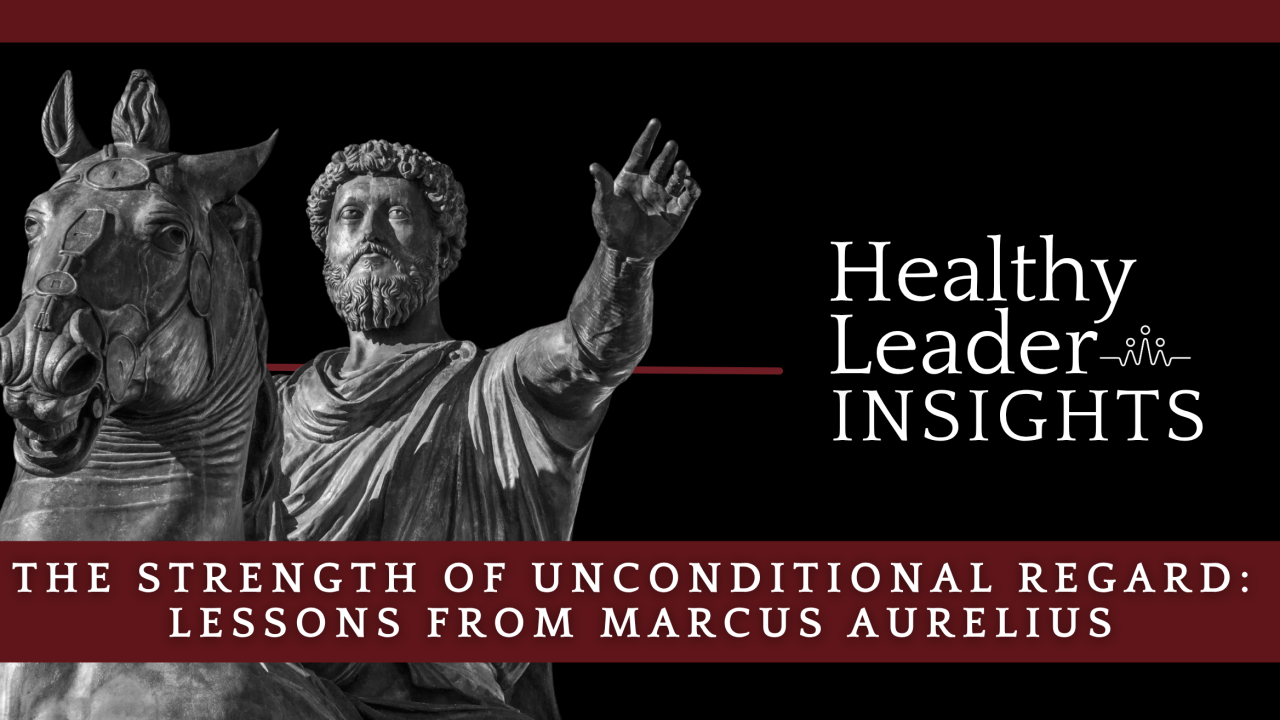The Strength of Unconditional Regard: What Marcus Aurelius Still Teaches Modern Leaders
Nov 21, 2025
What do you do when you feel like someone has betrayed you?
Betrayal doesn’t just test your strategy. It tests who you are, how you think, how you lead, and even how you experience life itself.
When Betrayal Met Restraint
In 175 AD, Rome’s philosopher-emperor Marcus Aurelius faced a crisis that could have destroyed both his empire and his peace of mind.
While commanding troops in the East, word reached him that his most trusted general, Avidius Cassius, had declared himself emperor.
It was treason at the highest level, and also deeply personal. Cassius had been one of Marcus’ most capable and loyal commanders. He had his confidence, his respect, even his friendship.
Marcus could have reacted with fury. Instead, he returned to Rome and gathered the Senate. He asked them for a formal vote to restore lawful order, not vengeance. When the revolt collapsed, the Senate urged him to follow tradition and execute Cassius’s family to prevent future uprisings.
Marcus refused. That refusal, against all political wisdom and cultural expectation, was an act of remarkable restraint.
He was guided by the Stoic idea: “It seemed so to him.”

The Wisdom Behind the Words
The phrase comes from Epictetus, one of Marcus’s teachers, in his Enchiridion, Chapter 42:
“When any person harms you, or speaks badly of you, remember that he acts or speaks from a supposition of it being his duty. … Say upon every occasion, ‘It seemed so to him.’”
Epictetus teaches that people act according to their own perceptions, beliefs, and judgments, not according to truth itself. When someone criticizes, deceives, or disappoints you, their actions reflect their reality, not necessarily reality.
“It seemed so to him” protects your mind from absorbing someone else’s distortion as your own. For Marcus, it meant seeing Cassius’s rebellion not through outrage but through understanding. Cassius believed his cause was just. That belief was incorrect, but it did explain his behavior.
Marcus’s mastery was not in denying the hurt. It was in refusing to let it dictate his leadership.
From Offense to Ownership
You may not command an empire, but you’ve probably faced your own version of betrayal: a colleague who discredits you, a partner who walks away, a friend who breaks trust.
In those moments of discovery, your body often reacts before your mind has time to catch up. The amygdala fires, stress hormones surge, and your brain narrows to threat mode. You feel it: the heat, the tightening, the internal storm that says, I can’t believe they did that.
Yet that very moment, the pause between what happens and how you respond, is your point of power. It is where leadership begins.
“It is the opportunity to lead yourself before you lead others.”
When you can regulate your own mind and emotions in the middle of conflict, you not only reclaim your personal agency, you model composure for everyone watching.
As you pause, name what you feel, and remind yourself, “It seemed so to them,” you begin to reset your internal chemistry. The body shifts out of stress response and back into balance. Clarity returns, and with it, the ability to choose how you want to lead.
Blood flow returns to the prefrontal cortex, the region responsible for reasoning, empathy, and perspective-taking. In that space, you shift from offense to ownership. It does not excuse what happened; it simply means you choose not to let it own you.

The Misunderstood Strength of Compassionate Clarity
One of the biggest misconceptions about unconditional positive regard is that it means weakness. Many assume that if you extend understanding or patience, you’re letting people off the hook or lowering your standards. Not at all. In reality, the opposite is true.
When you choose to see others as doing the best they can from their current level of awareness, you are not surrendering authority; you are exercising it.
This mindset keeps you in control of your own system, your thoughts, emotions, and actions, rather than letting frustration or judgment lead the way.
Psychologist Carl Rogers called this perspective unconditional positive regard, recognizing that empathy and accountability can coexist. Brené Brown calls it assuming best intent. Daniel Goleman, who pioneered the study of emotional intelligence, describes it as the ability to maintain empathy and self-regulation in moments of stress, one of the highest forms of leadership mastery.
This mindset benefits you internally, but it also transforms how others experience you. When leaders expect the best from people, research shows that people rise to meet those expectations.
In fact, a Harvard study on positive leadership found that employees who felt their manager believed in their capability were 31% more productive and three times more likely to stay engaged.
Think about someone you deeply respect, a person who remains calm under pressure, who listens before speaking, who looks for context instead of blame.
How do you behave around them?
Most people say they become more thoughtful, more open, more motivated to contribute.
That is the ripple effect of healthy leadership.
When you model composure and belief in others, you invite those same qualities forward in them.
True strength is not in control or correction; it is in creating the conditions for others to rise.
Healthy Leaders, Healthy Teams: The Lesson That Endures
Healthy leadership is not about eliminating stress. It is about recovering faster and leading through presence instead of reaction.
Neuroscience research shows that when leaders regulate their own emotions, their teams mirror that regulation. Team cortisol levels drop. Engagement and creativity rise.
Your internal state becomes the invisible architecture of your culture. If you assume hostility, you project defensiveness. If you assume effort, you project safety. And safety is what turns conflict into connection.
This truth is not new. It has been modeled for centuries.
When Avidius Cassius was eventually killed by his own soldiers, a messenger brought Marcus Aurelius the general’s severed head as proof of victory. Marcus refused to look at it and ordered it buried with dignity.
He had not simply restored order to his empire; he had demonstrated what it means to rule oneself first.
By choosing restraint over retaliation, Marcus modeled the essence of both individual leadership and influential leadership.
His self-command became an act of power that extended beyond personal integrity. It shaped the moral culture of his entire empire.
His restraint was not weakness. It was wisdom in action — the highest form of strength.
Two thousand years later, his lesson still holds. Strength is not how loud you respond to betrayal. It is how clearly you lead after it.
Because the health of an organization always begins with the health of the one leading it.
